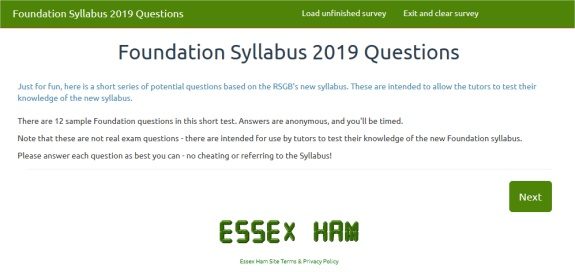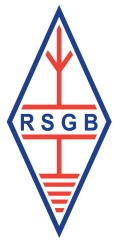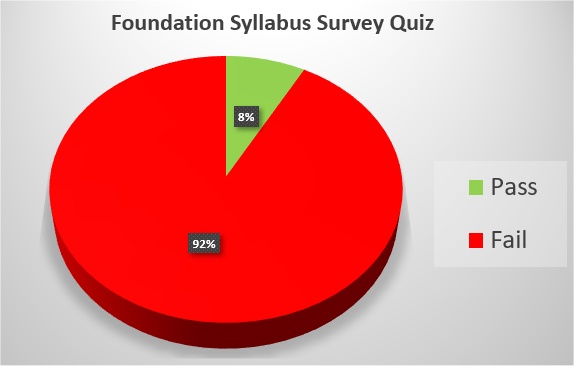Apologies folks, but we’ve had to close our Foundation Syllabus Survey. Although this is no longer available, we’re happy to bring you the results, for the record.

Why pull the survey?
 We received an email from a member of the RSGB Exam Standard Committee (ESC) on the 8th of March 2019. This claimed that the questions posted were “badly constructed” and “a bit misleading”.
We received an email from a member of the RSGB Exam Standard Committee (ESC) on the 8th of March 2019. This claimed that the questions posted were “badly constructed” and “a bit misleading”.
In response, it was pointed out that the questions were clearly signposted as ‘syllabus questions, aimed at tutors’, not ‘real-world exam questions’. The ESC was sent the reference links to the RSGB Syllabus, pointing out that the questions were almost word-for-word simple “recall” statements as written in the Foundation syllabus.
We’re still waiting for their response as to which questions (when compared to syllabus wording), they felt were misleading. Whilst we wait for their response, feel free to judge for yourself below.
A secondary reason for closing the survey, is that a member of one of the RSGB ESC’s sub-teams, decided for some reason to post a full set of answers to the questions on Twitter, effectively rendering ongoing results invalid.
Your Scores
The current pass mark at Foundation is 73%. We asked 12 questions based on the 2019 Foundation Syllabus. 311 amateurs took the test.

| Passes (>73%) | 8% (25 of 311 amateurs) |
| Average Mark | 40% |
| Average for trainers | 48% |
| Average for Foundation | 33% |
| Average for Intermediate | 35% |
| Average for Full (RAE) | 45% |
| Average for Full (Post-2004) | 47% |
Survey Questions and Answers
Here are the questions we asked, with the appropriate section from the 2019 syllabus…
1. When are you required to identify your station? On change of supervisor
Syllabus 1A5 – “Recall the requirements for station identification. Note: For the purposes of the examination this includes identifying when there is a change of: frequency, mode or type of transmission, including change of digital protocols, supervisor, or Regional Secondary Locator.”
Results: Only 19.2% of amateurs got this one correct. 64.7% wrongly selected that a callsign had to be given every 15 minutes.
Note: This requirement is not in the Ofcom Licence section covering identification, Section 13(1). This is arguably not applicable in the case of being under supervision on a club callsign, and is likely to be a licence problem for the supervisor (normally a higher level than Foundation), not for the person being supervised.
2. The sum of voltages across a number of resistors in series equals what? The supply voltage
Syllabus 2C2 – “Understand that the sum of the voltages across a number of resistors in series equals the supply voltage.”
Results: Better scores here, with 75% getting the correct answer
3. According to the Foundation syllabus 2019, the RF range that candidates have to remember is what? Below 30kHz to beyond 3000MHz
Syllabus 2E2 – “Recall that radio frequencies can range from below 30kHz to beyond 3000MHz.”
Results: Only 33% could recall the range. 38.5% wrongly selected “Below 300kHz to beyond 3000MHz”
4. What best defines a digital signal? A stream of finite values at a specific sampling interval
Syllabus 2F1 – “Recall that digital signals are a stream of finite values at a specific sampling interval.”
Results: 68.9% got this correct
5. What best describes a secondary battery? A battery with a reversible process
Syllabus 2J1 – “Understand that a rechargeable (secondary) battery has a reversible chemical process.”
Results: Only 49% identified that a secondary battery is rechargeable. 33.1% opted for the answer of “non-rechargeable”
6. When RF and AF are modulated together, the new frequencies produced are referred to as what? Sidebands
Syllabus 3A3 – “Recall that when radio frequencies are modulated (mixed) with an audio frequency the new frequencies that are generated are called
sidebands.”
Results: Answered correctly by 58%
7. In an SDR, what enables signals to be sifted into separate frequency components? A mathematical operation
Syllabus 3M1 – “Recall that a mathematical operation enables all the signals to be sifted into separate frequency components.”
Results: 38.1% got this correct
8. What best defines loss in feeder? The conversion of RF to heat
Syllabus 4A2 – Recall that some RF energy is converted to heat in feeders so they exhibit loss.
Results: 43.9% got this one
9. Gain is measured in dB and is normally expressed relative to what? A half-wave dipole
Syllabus 4C3 – Recall the gain of an antenna is normally expressed relative to a half-wave dipole and measured in dB
Results: A controversial one. 49.7% got this, and it’s kicked off an interesting debate amongst tutors (dBd vs dBi)
10. What should you do before installing a rig in your car? Answer: Check compatibility with the vehicle’s electrical and management systems, seek professional advice, and check with your motor insurance provider
Syllabus 6F1 – “Recall that it is the vehicle owner’s responsibility to ensure that any radio installation is compatible with the vehicles electrical and management systems and does not affect vehicle safety. Recall that the fact of the installation may have to be disclosed to the vehicle insurers. Recall that professional advice should be sought for all vehicle installations.
Results: 52.9% got this as an “all of the above” question
11. What must you do before setting up an RF earth? Contact your District Network Operator
Syllabus 8A2 – “Recall that the District Network Operator responsible for the physical supply to your premises must be consulted before making changes such as an RF earth.”
Results: Hmm, only 19.2% got this one. 33% thought you needed to connect an RCBO (Residual Current Circuit Breaker with Over Current Protection), but most amateurs (44%) opted for “Check ICNIRP guidelines”. In case you didn’t know – ICNIRP stands for the International Commission on Non-Ionizing Radiation Protection.
12. A circuit has a 12V battery, an LED with a typical current of 20mA and a 470ohm resistor. What would the addition of another 470ohm resistor in parallel with the existing resistor do to the current in the LED? It would double
Syllabus 10B2 – “Demonstrate that connecting another resistor of the same value in parallel with the existing resistor results in a doubling of the current
in the LED. Explain the reason to the tutor.”
Results: Just over half got this correct (51.2%).
Note:This item formed part of a new Foundation practical designed to introduce resistors in series & parallel at Foundation. It’s now been dropped from the syllabus, following lobbying from clubs including Essex Ham.
Survey Stats
399 responses were received. After filtering those without a licence, and those who only partially-completed the survey, 311 responses were received by the closing date (8th March 2019).
- Licence class: 62.9% Full, 21.3% Foundation, 15.8% Intermediate
- Trainers: 102 responses were from those active in UK training
Respondent Views
We asked: “Do you think that it is necessary for newcomers to be able to answer these 12 questions correctly before they can be allowed to get their first licence & use a radio unsupervised?”
- No: 51.3%
- Yes: 26.1%
- Unsure: 22.58%
| Yes, this is necessary | Percentage of group who say “yes” | And their average score |
| Foundation | 24.2% | 34% |
| Intermediate | 30.0% | 40% |
| Full (RAE) | 30.4% | 45% |
| Full (Post-2004) | 19.3% | 47% |
| Trainers | 25.5% | 48% |
Not in Syllabus until Intermediate
Did you know that the RSGB feels that Foundation candidates don’t need to know about Q-Codes, Nets, Awards, Contests and working satellites? The 2019 Syllabus sees these as Intermediate-level material..
| Nets | Intermediate 1C1: “Understand the licence requirements for net operation” |
| Q-Codes | Intermediate 7E1: “Recall the meaning and the reason for use of the Q codes: QRM, QRN, QRO, QRP, QRT, QSB, QSL, QSO, QSY, QTH.” |
| Working Satellites | Intermediate 7G1: “Recall that satellites orbit the Earth at heights above 250km, and understand that most amateur satellites are moving in relation to the Earth and will only be above the horizon at certain times.” Intermediate 7G3: “Understand that amateur satellites can only be used when they are above the horizon at both the sending and receiving stations, and that the movement of the satellite will cause frequency variation, known as Doppler shift, on the received signal, which must be allowed for when selecting operating frequencies” |
| Awards | Intermediate 7A4: “Recall that there are awards available for achievements which include: working continents, countries, islands, prefixes, locator squares and that variations may include certain frequency bands or low power.” |
| Contests | Intermediate 7A4: “Recall that amateur radio contests require the exchange of information such as signal report, serial number and location. Recall that contests often have sections for different bands, power levels and modes.” |
Related links
Your views?
Newcomers entering the hobby dropped by 9% in the last report. Will harder exams at Foundation and Intermediate reduce this even further? Or do you think we need to increase the bar to make the hobby more theory-based?
Do you think our questions were “misleading”? Or is what’s been asked in the syllabus to blame for the 8% pass rate on this survey?
Do you agree that Nets and Q-Codes are an “Intermediate and above” part of the hobby, and not anything to ask M7s about?
Please add your thoughts below…


The face of amateur radio. No riff-raff. Only those with the right IQ and education should be allowed in. Well done RSGB. Have a cigar.
This is an appalling state of affairs. Healthy debate around topics of interest is a sign of a healthy environment. Its the same in many hobbies and sports. I find it hard to understand why the RSGB would sabotage and willfully undermine debate on a topic that is so crucial to the future of the hobby.
The fact that the RSGB holds the keys to the hobby so tightly within its grasp as the SOLE authorised examiner is immediately cause for concern since, without proper oversight and firm control, they could destroy the hobby in the UK completely. Of course, the commercial interests at the RSGB have no interest in so doing but it would seem that the ESC is a law unto itself – working actively to stifle this debate.
I’m not a member of the RSGB for other reasons but my stance is unlikely to soften in the light of this continued ‘bad behaviour’. It is likely that they will only wake up as they see their membership and revenues diminish as their highly experienced and ‘superior’ core dies off. By then, as a commercially-based examiner, the writing will be on the wall. I’d suggest that significant effort should be put into creating another organisation that can become accredited as an alternative examiner so that the hobby does not die in the hands of what seems to be an outdated organisation that is doing its best to destroy the future of the hobby.
They do this so they can make more money by people failing there exam. Nothing else it’s for them to make more money.
Examinations Standards Committee Annual Report | 2018
Page 1of 9
Report The Annual Report of the RSGB Examination Standards Committee
May 2018 In 2017 the RSGB Examinations Department and the Examinations Group, overseen by
the Examinations Standards Committee have continued their main task of operating the
amateur radio examinations process. The total enrolment on all examinations fell by just
under 10% compared to 2016 .
However, pass rates remained largely unchanged. Work on the syllabus review has continued
during the year, and the new syllabus has been approved by OFCOM. On -demand examinations are now available at all levels and the roll out of on-line examinations provided by TestReach to all levels has been completed.
Anthony J Kent, G8PBH ESC.Chair@RSGB.org.uk
Tony Kent. Professor of Physics, Faculty of Science
https://www.nottingham.ac.uk/physics/people/anthony.kent
Current Research
My research is concerned with the fundamental physical properties of III-V semiconductor nanostructures and devices including those based on Gallium Arsenide and Gallium Nitride. Electronic transport and optical, particularly ultra-fast, techniques are used to study the interaction of electrons and holes with lattice vibrations (phonons). Of particular interest is electron-phonon interaction in multilayered semiconductor strucures, e.g. superlattices. These structures can be used to generate, manipulate and detect coherent nanoacoustic waves (sound waves with nanometre wavelength). Such waves may find applications in the probing and imaging of nanostructures and controlling light including millimetre waves. Through design of novel superlattice structures that can both amplify phonons due to the electron-phonon interaction and confine phonons in an acoustic cavity we can build a saser device (the equivalent of a laser, but for THz sound instead of light). This work is carried out in collaboration with theoretical physicist colleagues in Dresden and Kiev.
For more details see the semiconductor physics web pages
https://thersgb.org/publications/committees/esc/2018/2018-may-annual-report-of-the-rsgb-examination-standards-committee-update.pdf
All I can think is that if it is made harder, it will result in fewer licensed Amateur Radio Operators and more Pirates.
Re: The question about “Gain”. To Quote..
Gain is measured in dB and is normally expressed relative to what?
Pure Gain, is the output over input of course.
Be it “10xLog(10) P2/P1” or “20xLog(10)V2/V1” (For the same impedance.)
But in any case I think all that is not for the “Foundation” course.
The “Question” itself, actually mentions nothing about Antenna’s. It is only when looking at the choices you would realise they are talking about Antenna performance. Very poor.
As to the dBd vs dBi argument. An “Isotropic Radiator” is a theoretical device in regards to Antenna’s, but it is well defined in Physics, plus dBi is used commonly in professional circles. What should be taught, is the difference between dBi and dBd, and why it matters.
As to Mr Kent’s letter. OK, Impressive qualifications and day job, but in reality, whoever is overseeing all this should perhaps have a recognised qualification (or equivalent time served experience) in Electronics and RF, rather than Physics.
Regards.
G8KBV
Hi Dave. Fair point on the wording of the ‘Gain’ question, although the only ‘gain’ taught at Foundation, is antenna gain, and the four possible answers all had antenna-related options. I do agree though, “Antenna gain is measured…” would have been a better choice of wording.
Thanks, Pete M0PSX
I as a tutor feel that the alterations to the Foundation Exam is doing a lot of damage.
I had three persons interested in doing the Foundation, all had the old manual but time ran out and when I gave then the new manual they jointly felt that it was just too much of a change and they have now opted out of the course.No doubt they will spread the word that it is too difficult to become a Radio Amateur.
We need new members in our hobby and In my experience once one gets the initial license the incentive is there to move up the ladder and that is exactly what happens in our Club.
The new system will result in a decrease of new amateurs.
Why have you messed about, it was not broken so why fix it KISS is the best way to get new members started
I passed my foundation licence may last year.
And will b going for my intermediate next year.
I used to get the same answers wrong all the time taking my mok tests,it was the lads at the course that kept learning me I have to thank. And it will b them that will help next time to,even if it takes a while longer,u have learned want you need to learn,so bring it on lol. Daz M6AHQ
The RSGB come across as a bunch of ego-ridden, arrogant snobs, and I say that as someone who joined his local amateur radio club only two weeks ago to get his Foundation licence. They remind me of the F1 hierarchy – a complete lack of transparency.
I’ve already found the RSGB to be unhelpful almost to the point of contemptuous towards newcomers to the hobby, and if I could get my £55 club membership and exams fees refunded I would.
I’m really not impressed. Really!
the licence has always been a sore point,and the way some have achieved it begs the question,there is too much control by a few who want the hobby to suit themselves and the school tie.i always thought it was for training and to advance ones knowledge,for some that is fine,but for many the exams are difficult and alot of useless study. and outdated, as modern technology has over taken radio and the mobile phone is so good,no licence required, no training, no uncertainty with propagation and connect all around the globe so why go through this , when there is a far better system of contact and more fun